Last Updated on November 6, 2025
Choosing the best boiler for a large house in the UK can guarantee efficiency and comfort through the winter while reducing your energy costs.
A home with four or more bedrooms, several bathrooms, and a high demand for heating and hot water needs more than a standard setup. It needs a system powerful enough to deliver consistent warmth to every room without wasting energy.
According to Ofgem, large households of four to five people typically use around 17,000 kWh of gas each year, which means the boiler you choose will have a direct impact on your energy bills and long-term savings. The best boilers for large homes can strike a balance of power with precision.
They heat multiple radiators and fill baths quickly while maintaining efficiency levels that older systems could never achieve. Whether you live in a spacious detached property or a period home with thick walls and high ceilings, the right boiler can make the difference between rising costs and reliable comfort.
🔥 Need a New Boiler? Get a Fixed Price in 90 Seconds
Don’t waste time phoning around — Heatable shows you the best boiler deals online in under two minutes. No sales calls, no hidden fees, just instant prices from a trusted installer.
Get Your Fixed Price NowUnderstanding boiler size, output, and type is the first step toward finding a model that suits your home’s unique needs and maintains a comfortable temperature in every room, even on the coldest days.
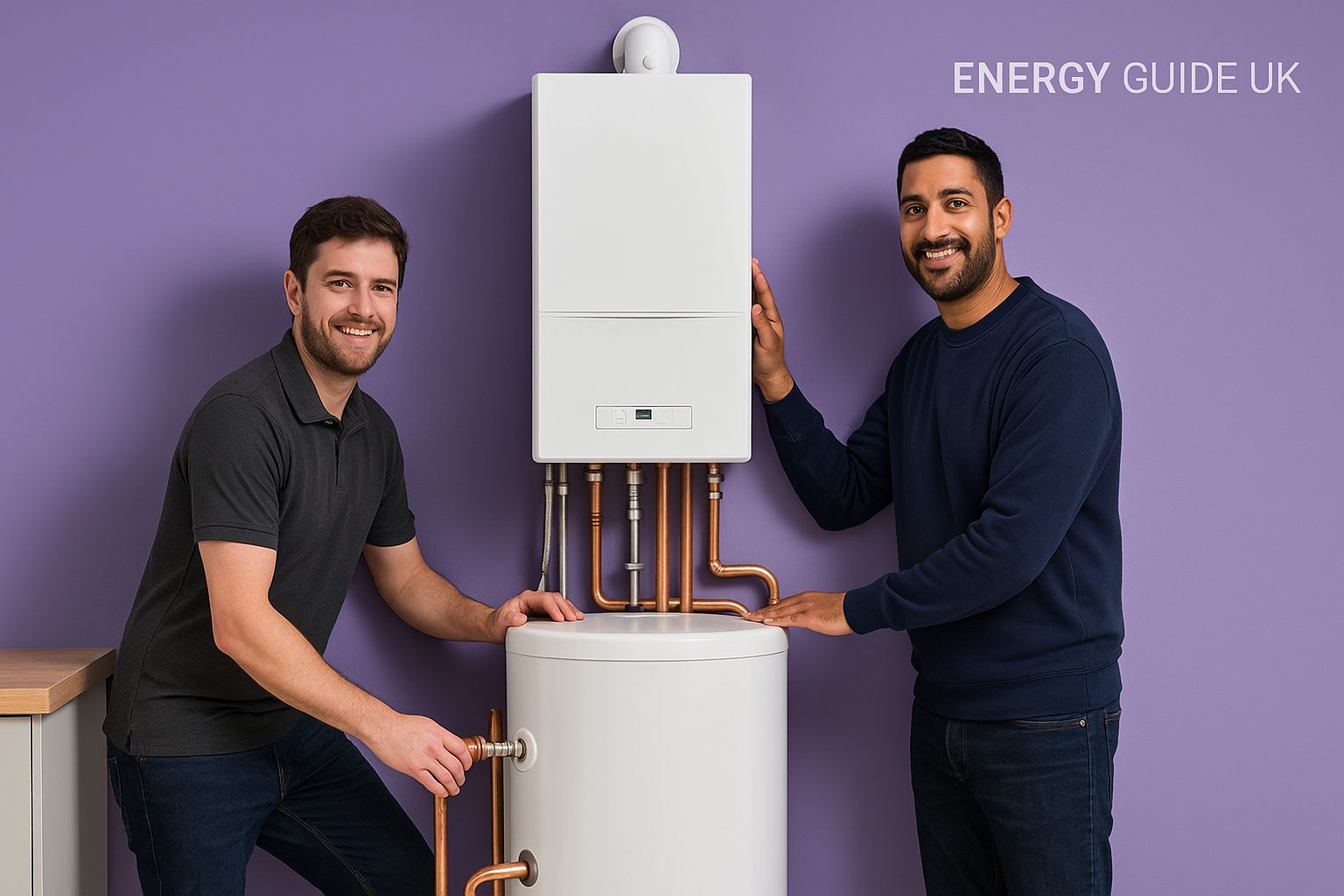
Key Takeaways on the Best Boiler for a Large House in the UK:
- Choosing the right boiler ensures consistent warmth, efficient performance, and lower energy bills throughout the year.
- System or regular boilers are best suited to large homes with several bathrooms, while high-output combi models work well for modern houses with good water pressure.
- The correct boiler size depends on the radiator count, the number of bathrooms, and the home’s insulation, rather than square footage alone.
- Upgrading an older boiler to a modern condensing model improves efficiency and comfort while reducing environmental impact.
- Smart thermostats, zoning systems, and radiator controls help large households conserve energy and manage their usage more effectively.
- A hydrogen-ready boiler with a strong warranty offers reliability today and flexibility for future energy changes in the UK.
- Proper installation, routine maintenance, and good insulation make the biggest difference to long-term performance and running costs.
What Size Boiler Do You Need for a Large House?
Boiler size is more than just a number. It determines how well your heating system can meet the demands of your home.
For large UK homes with multiple bedrooms, several bathrooms, and numerous radiators, the output power measured in kilowatts (kW) becomes a key factor. A boiler that’s too small will struggle to deliver steady warmth and consistent hot water, while an oversized one can waste energy and drive up your bills.
Most large homes fall within the range of 30 kW to 50 kW, depending on layout, insulation, and hot-water demand. The best starting point is the number of radiators and bathrooms your property has.
Homes with 15–20 radiators and two or more bathrooms generally require a system or regular boiler with an output between 35 kW and 45 kW. In contrast, smaller homes with strong mains pressure may still be suitable for a high-output combi boiler, typically around 35–40 kW.
| Home Size | Radiators | Bathrooms | Recommended Output (kW) | Ideal Boiler Type |
| 3–4 bedrooms | 10–15 | 1–2 | 24–30 | Combi / System |
| 4–5 bedrooms | 15–20 | 2–3 | 30–40 | System / Regular |
| 6+ bedrooms | 20+ | 3–5 | 40–50 | System / Regular |
Flow rate is equally important. Large households often need a high water flow of at least 15 litres per minute to keep multiple showers running without losing pressure.
For a more precise estimate, you can use Energy Guide’s Boiler Size Calculator, which takes into account your property’s radiator count, number of bathrooms, and heating preferences to recommend the most efficient model for your home.
Discover the various types of boilers, including condensing boilers, LPG boilers, oil boilers, and OpenTherm boilers, in our comprehensive guides.
Best Boiler for A Large House Based on Type
Large homes place heavier demands on heating and hot water systems, so choosing the right boiler type is just as important as getting the right output. The three main options are combi, system, and regular boilers, each with its advantages, depending on your home’s layout, water pressure, and the number of people living there.
Understanding how these systems differ will help you choose a setup that keeps every room warm and every shower hot, even during peak use.
Combi Boilers for Large Houses
A combi boiler combines heating and hot water in a single compact unit. It heats water directly from the mains, eliminating the need for a separate cylinder or tank.
For large homes, a high-output combi boiler (typically between 35 kW and 40 kW) may be suitable if the water pressure is strong and there are no more than two bathrooms in use simultaneously.
Advantages
- Space-saving design with no tanks or cylinders
- Delivers instant hot water on demand
- Simple installation and lower maintenance costs
Limitations
- Can struggle to supply multiple taps or showers simultaneously
- Relies heavily on good mains water pressure
Example models: Worcester Bosch Greenstar 8000 Style 40 kW, Ideal Logic Max C40, Viessmann Vitodens 200-W 35 kW
System Boilers for Large Houses
System boilers are the most common choice for large homes with several bathrooms. According to the Energy Saving Trust, they’re a good choice for larger families with higher hot water needs.
System boilers utilize a separate, unvented hot-water cylinder, enabling multiple taps to run simultaneously without a loss of pressure. Key components, such as the pump and expansion vessel, are built in, making them more efficient and easier to install than heat-only systems.
Advantages
- Consistent hot water for several bathrooms at once
- Works well with modern pressurised systems
- Suitable for solar thermal and smart heating setups
Limitations
- Requires space for a cylinder, usually in an airing cupboard
- Hot water supply is limited to the cylinder’s storage volume
Example models: Vaillant ecoTEC Plus 630, Worcester Bosch Greenstar System 8000 Life 35 kW, Ideal Vogue Max 32 kW
Regular (Conventional) Boilers for Large Houses
Regular boilers, also called conventional or heat-only boilers, are ideal for older or very large properties with existing tanks and extensive radiator networks. They store hot water in a cylinder and rely on a cold-water tank in the loft.
While they occupy more space, they offer excellent flow rates and can handle extremely high demand, making them ideal for homes with multiple bathrooms and heating zones.
Advantages
- Strong, steady hot water for large households
- Compatible with older heating systems and large radiator circuits
- Can operate in areas with low mains pressure
Limitations
- Requires loft and airing cupboard space for tanks
- Installation is more complex and expensive than a combi
Example models: Baxi 800 Heat 30 kW, Worcester Bosch 30 Ri, Ideal Logic Heat 30 kW
Quick Comparison Table
| Boiler Type | Ideal For | Hot Water Supply | Space Needed | Best For Homes With |
| Combi | Smaller large homes with 1–2 bathrooms | Instant, on demand | Minimal | Strong mains pressure |
| System | Medium to very large homes | Stored in a cylinder | Moderate | 2–4 bathrooms |
| Regular | Large or traditional properties | Stored in a cylinder | High (tank + cylinder) | 3–5 bathrooms, older systems |
Choosing between these types depends on how your household uses hot water and the available storage space. For most large properties, a system boiler with a high-capacity unvented cylinder offers the best balance between efficiency and performance.
Top Picks for the Best Boiler for A Large House
Selecting the right boiler for a large house isn’t just about power. You must also match performance, efficiency, and reliability to your home’s specific needs. The models below have a strong heating output, the ability to handle multiple bathrooms, and a proven track record for long-term dependability.
Best Combi Boiler for A Large House
1. Worcester Bosch Greenstar 8000 Style 40 kW
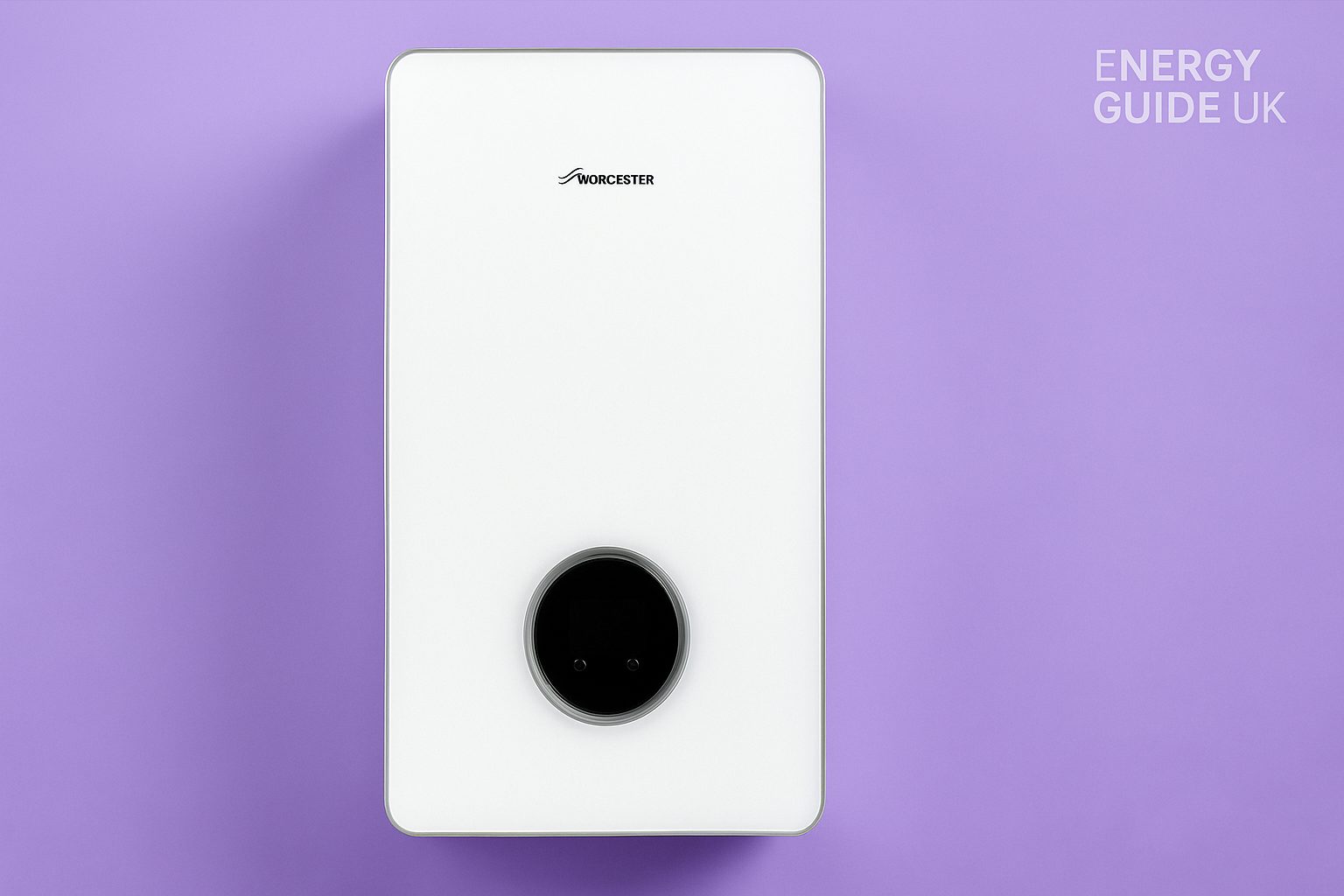
A powerful premium combi designed for spacious homes with two bathrooms. It delivers up to 17 litres of hot water per minute, maintaining a steady flow even when two taps are used simultaneously. Known for its quiet operation, sleek design, and compatibility with smart thermostats.
- Efficiency: 94% (A-rated)
- Flow Rate: 17 L/min
- Warranty: Up to 12 years with the installer package
- Ideal For: 4–5 bedroom homes with strong mains pressure
- Quick Tip: Great balance of power and design—ideal upgrade for modern large properties.
2. Ideal Logic Max C40
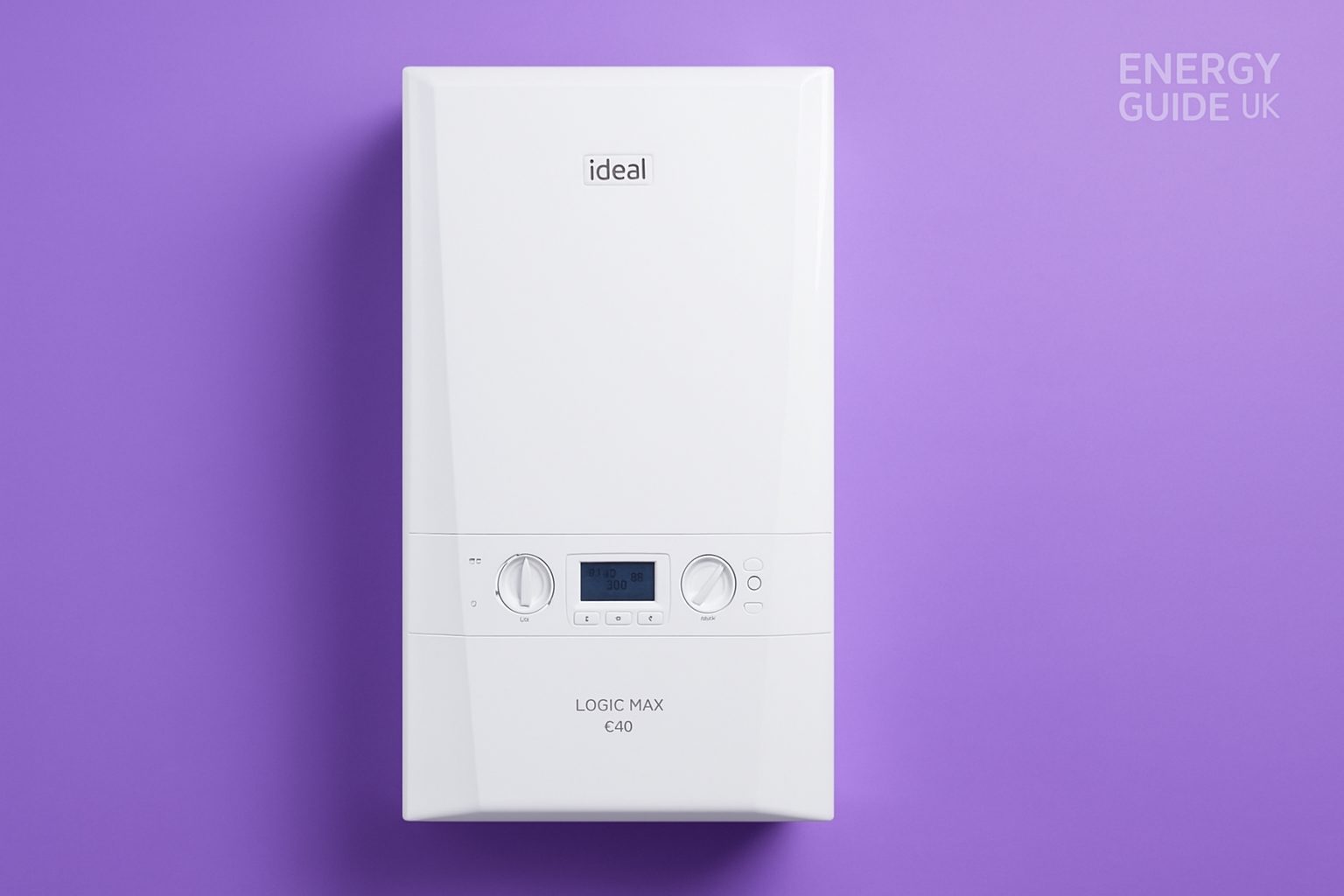
Compact yet powerful, the Logic Max C40 offers high water flow and reliable performance for busy family homes. It’s designed for easy servicing and backed by a long warranty, making it one of the most installer-friendly combis in its class.
- Efficiency: 94%
- Flow Rate: 16.4 L/min
- Warranty: 10 years
- Ideal For: 4-bedroom detached homes with two bathrooms
- Quick Tip: Offers top performance for its size—strong value choice.
3. Viessmann Vitodens 200-W 35 kW
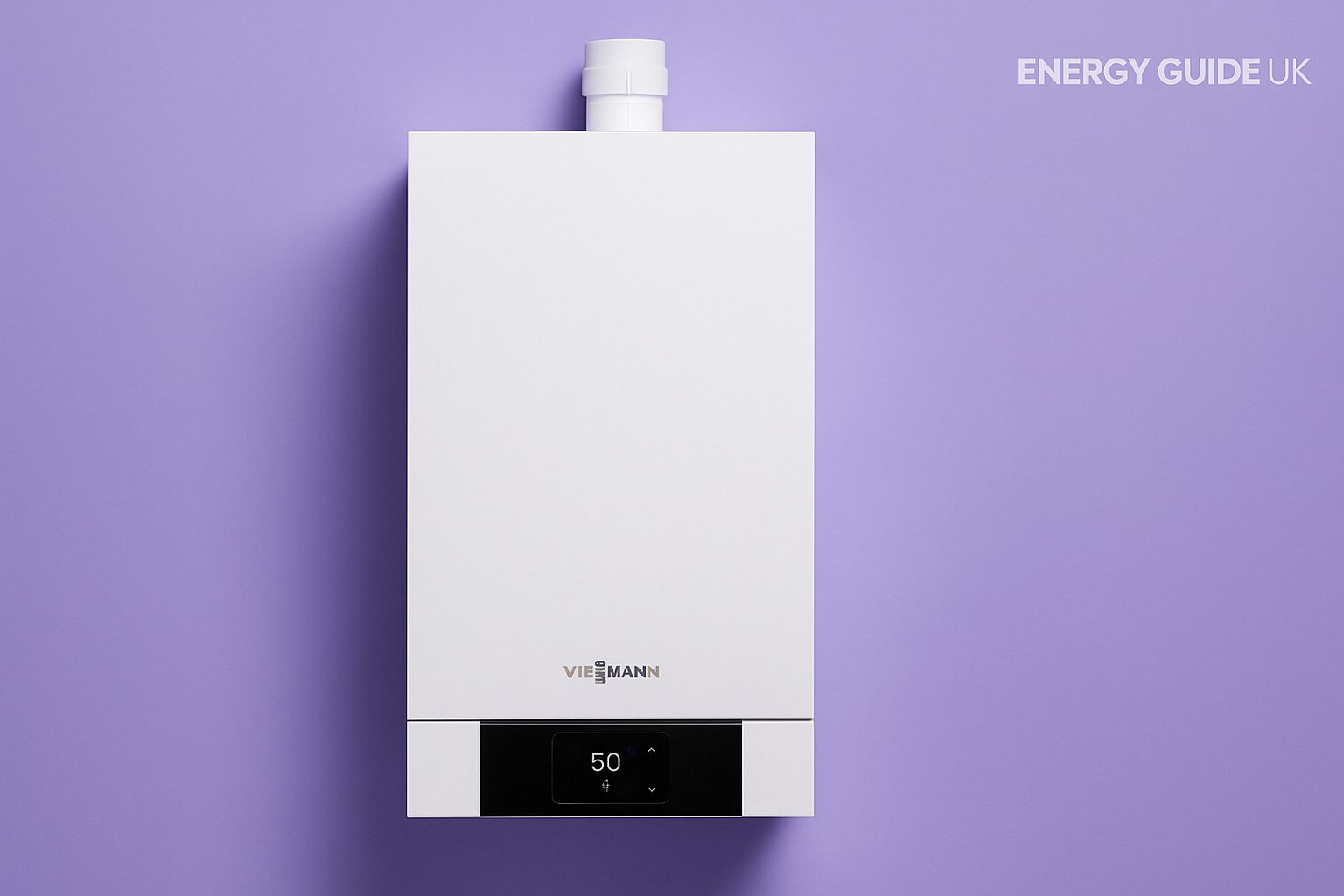
Combines advanced German engineering with outstanding efficiency. The stainless-steel heat exchanger boosts reliability, while smart control integration helps optimise gas use based on weather and household demand.
- Efficiency: 95%
- Flow Rate: 14 L/min
- Warranty: 10 years
- Ideal For: Well-insulated large homes with high hot-water demand
- Quick Tip: Excellent for long-term energy savings and low maintenance.
| Model | Output (kW) | Flow Rate (L/min) | Efficiency | Warranty | Best For |
| Worcester Bosch Greenstar 8000 Style | 40 | 17 | 94% | Up to 12 yrs | Large modern homes |
| Ideal Logic Max C40 | 40 | 16.4 | 94% | 10 yrs | Family homes |
| Viessmann Vitodens 200-W | 35 | 14 | 95% | 10 yrs | High-efficiency seekers |
Best System Boiler for A Large House
1. Vaillant ecoTEC Plus 630
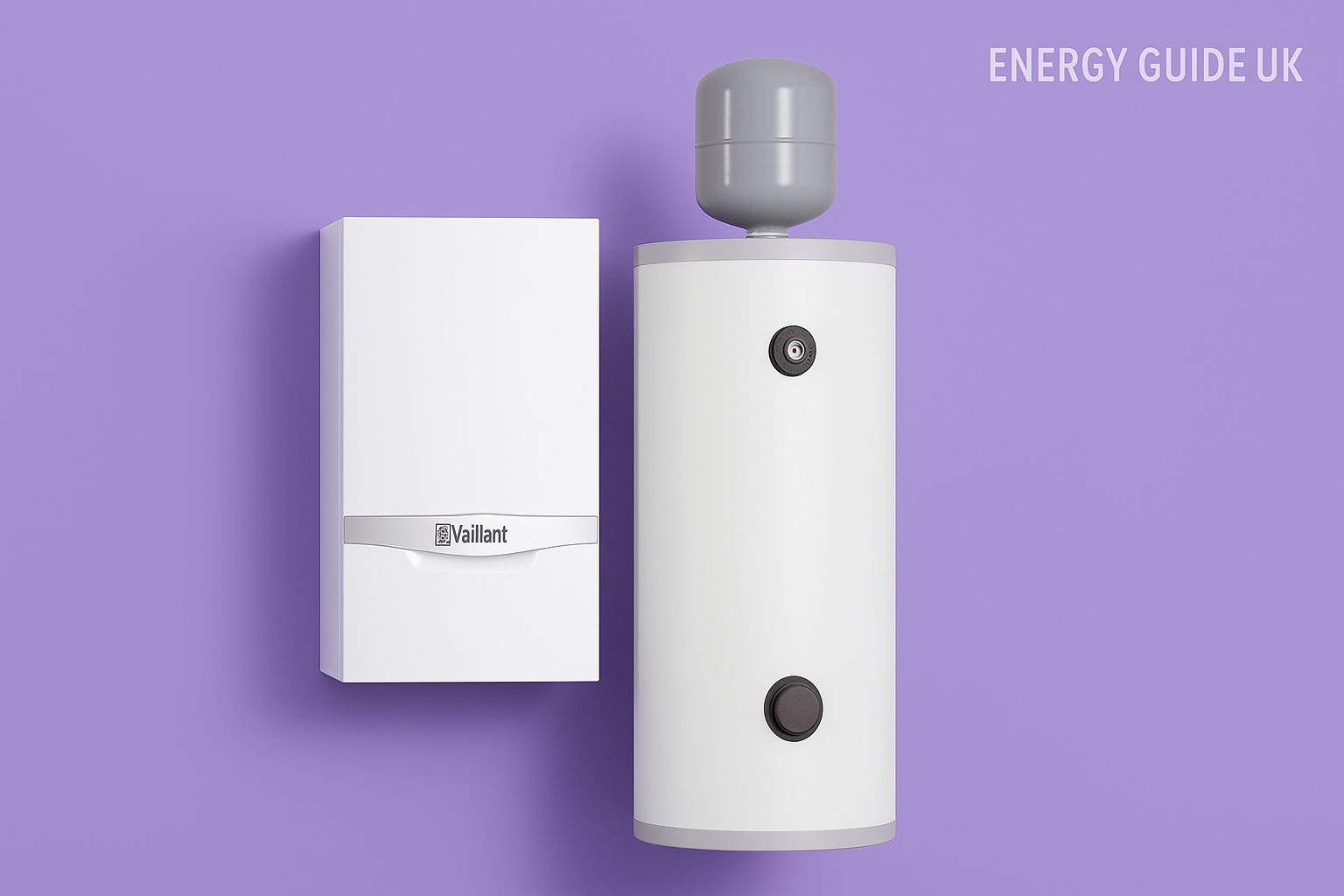
A flagship system boiler that delivers excellent efficiency and reliability. It’s designed for homes with multiple bathrooms and can be paired with an unvented cylinder to maintain pressure and ensure a constant hot water flow.
- Efficiency: 94%
- Output: 30 kW
- Warranty: Up to 10 years
- Ideal For: 4–5 bedroom homes with 2–3 bathrooms
- Quick Tip: A dependable system for families who want comfort and control.
2. Worcester Bosch Greenstar System 8000 Life 35 kW
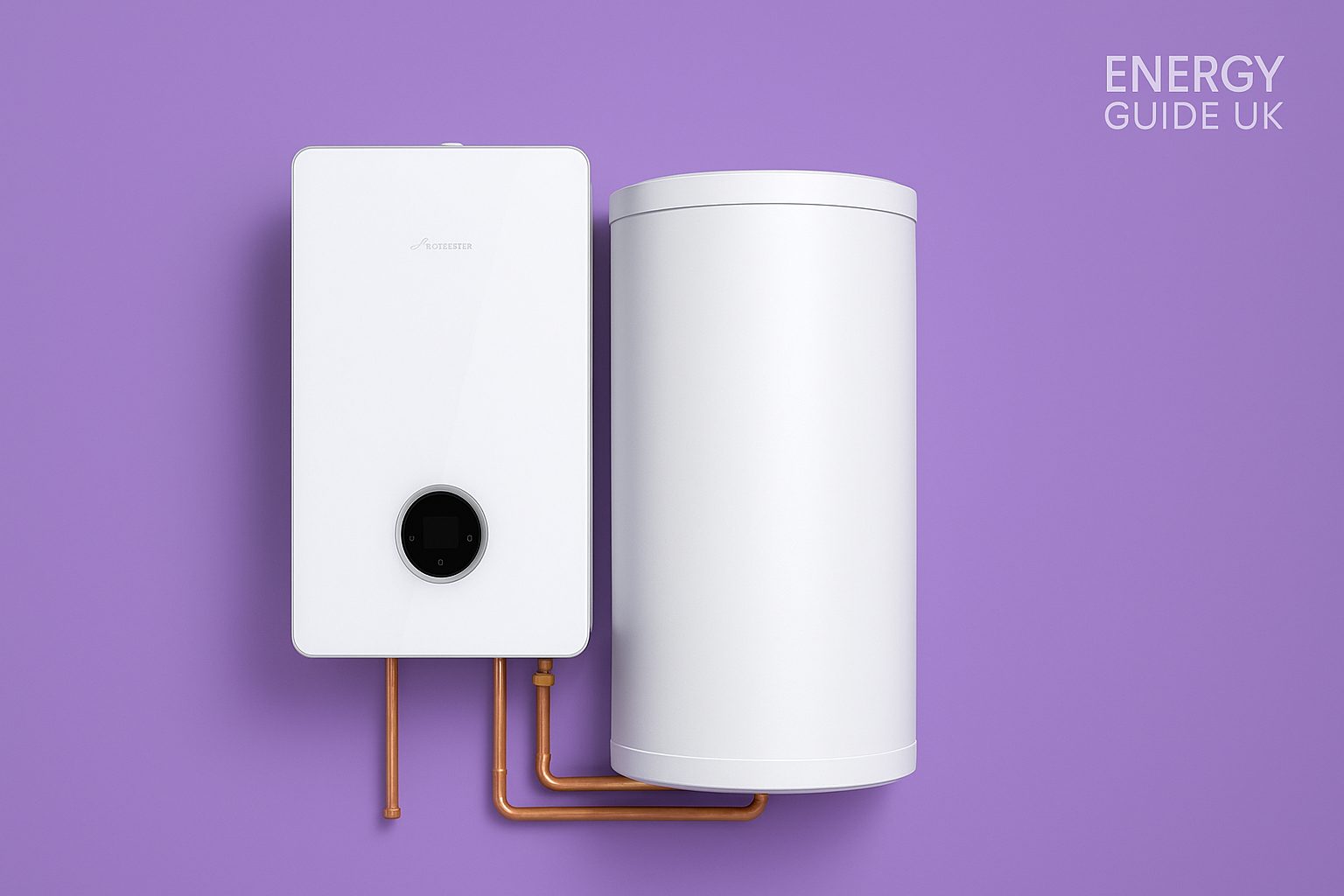
This high-capacity model provides rapid heat recovery and a consistent water supply for multiple outlets. The design supports smart thermostats and zoning, helping homeowners fine-tune energy use across large spaces.
- Efficiency: 94%
- Output: 35 kW
- Warranty: Up to 12 years
- Ideal For: 5–6 bedroom homes with up to 4 bathrooms
- Quick Tip: Designed for luxury-level comfort with minimal energy waste.
3. Ideal Vogue Max 32 kW
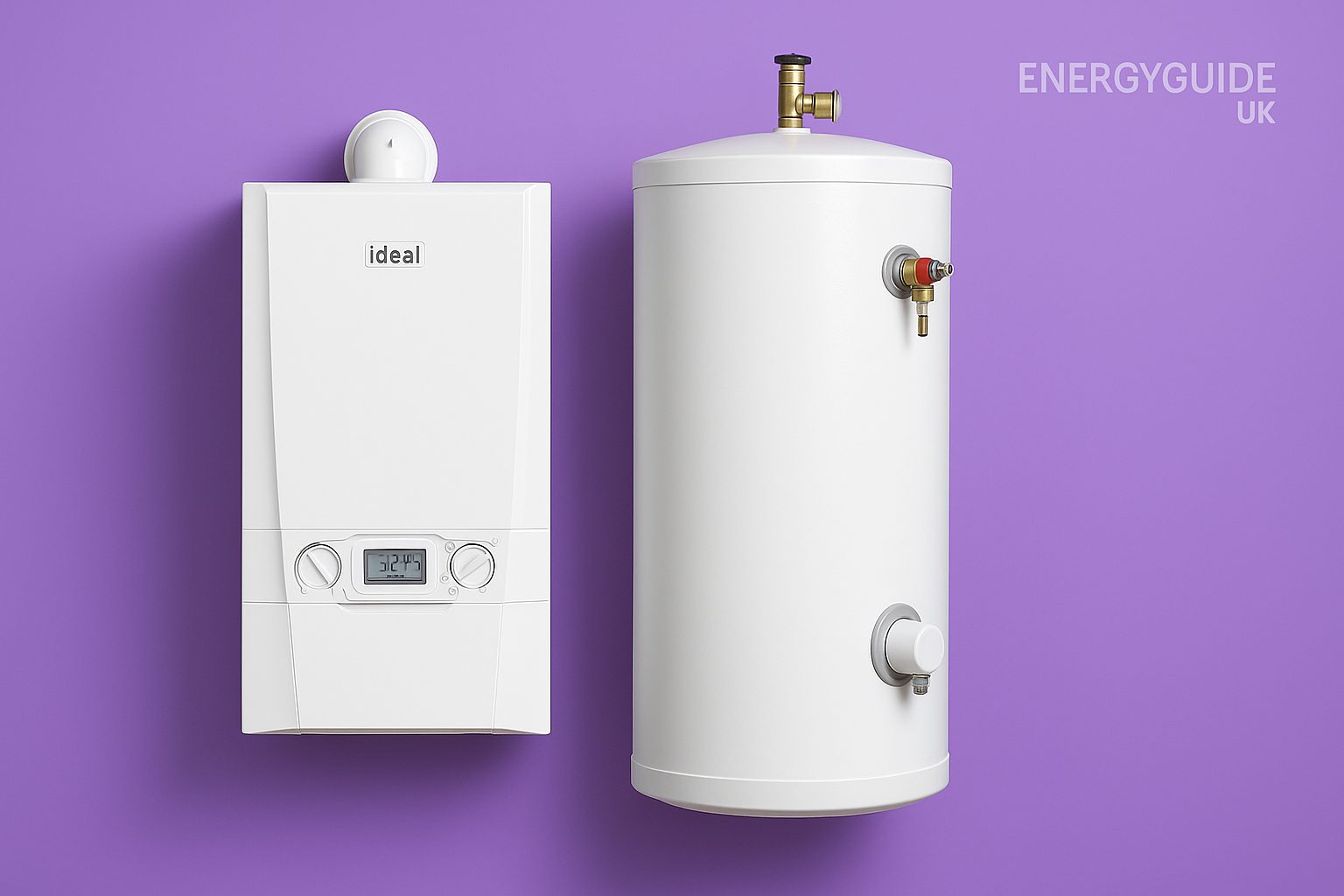
Built with robust components and a stainless-steel heat exchanger, the Vogue Max offers efficient heating for medium to large homes. Paired with a cylinder, it can easily handle multi-bathroom setups.
- Efficiency: 94%
- Output: 32 kW
- Warranty: 12 years
- Ideal For: Detached homes with high heating loads
- Quick Tip: Combines top-tier reliability with sleek modern controls.
| Model | Output (kW) | Efficiency | Warranty | Best For |
| Vaillant ecoTEC Plus 630 | 30 | 94% | Up to 10 yrs | Family homes |
| Worcester Bosch 8000 Life System | 35 | 94% | Up to 12 yrs | Multi-bathroom properties |
| Ideal Vogue Max 32 | 32 | 94% | 12 yrs | Detached homes |
Best Regular Boiler for A Large House
1. Baxi 800 Heat 30 kW
Lightweight, compact, and compatible with traditional heating setups. Perfect for large properties with tanks and older radiator systems.
- Efficiency: 93%
- Output: 30 kW
- Warranty: 10 years
- Ideal For: 5 + bedroom homes with older pipework
- Quick Tip: Excellent replacement option for aging regular boilers.
2. Worcester Bosch Greenstar Ri 30 kW
Designed specifically for larger properties with conventional systems. Reliable and easy to maintain, it’s built to deliver strong, consistent heating performance.
- Efficiency: 93%
- Output: 30 kW
- Warranty: Up to 10 years
- Ideal For: Large homes with loft tanks and older systems
- Quick Tip: Long-term durability with trusted Worcester quality.
3. Ideal Logic Heat 30 kW
A compact, efficient, regular boiler that fits neatly into airing cupboards. Ideal for homes that require consistent heat and have a high demand for hot water.
- Efficiency: 94%
- Output: 30 kW
- Warranty: 10 years
- Ideal For: Older large homes or period properties
- Quick Tip: Dependable and budget-friendly option for traditional heating setups.
| Model | Output (kW) | Efficiency | Warranty | Best For |
| Baxi 800 Heat | 30 | 93% | 10 yrs | 5 + bed homes |
| Worcester Bosch Greenstar Ri | 30 | 93% | Up to 10 yrs | Traditional systems |
| Ideal Logic Heat 30 | 30 | 94% | 10 yrs | Period homes |
Each of these boilers delivers reliable, efficient heating tailored to large homes in the UK. In most cases, a system boiler paired with an unvented cylinder will provide the best overall balance of power and performance.
However, if you have limited space or prefer a single-unit setup, a high-output combi boiler can still provide strong results, especially in well-insulated modern properties.
Installation and Running Costs for Large-Home Boilers
Understanding the full cost of choosing and operating a boiler in a large house is vital for making informed decisions. The upfront installation cost, ongoing energy usage, and maintenance all contribute to the total. This section outlines what to expect in the UK market and provides practical guidance tailored to larger properties.
Installation Costs
According to the Energy Saving Trust, the average cost of a new or replacement boiler is £3,700, but this can vary depending on your specific setup. Large homes with 4+ bedrooms (many of which have multiple radiators and bathrooms) may require 26-40 kW units, and the cost is often higher.
Key influencing factors include:
- The boiler’s output (higher kW = more cost)
- The boiler type (combi, system, regular) – system & regular setups usually cost more due to cylinder/tank infrastructure.
- Location and accessibility (e.g., loft tanks, pipework changes)
- Whether existing pipework, radiators, or controls need upgrading
- Installation dates (off-season vs busy times)
You can expect to pay between £3,000 and £6,000, or more, for fitting a high-capacity boiler with a cylinder or tank setup in a large home, especially if significant modifications are required.
Annual Running Costs
For large households (with 4+ bedrooms and multiple bathrooms), demand is high. You can typically have many radiators heating simultaneously, and several hot-water outlets in use.
Using Ofgem’s figure of 17,000 kWh of gas annually for large homes, we can gauge that a more efficient modern boiler can make meaningful savings.
Older or inefficient boilers may have lower efficiency (say 85% vs. modern 94-95%), meaning more fuel is wasted as heat loss.
- Under the old boiler: 17,000 kWh / 0.85 ≈ 20,000 kWh of input (approx)
- With a modern boiler at 95% efficiency: 17,000 kWh / 0.95 ≈ 17,900 kWh of input
This means potentially saving ~2,100 kWh of gas per year. If your house uses more gas (due to multiple baths/showers, or many rooms), the savings could be even greater. Upgrading to a high-efficiency unit can reduce energy consumption and, consequently, lower your bills.
Maintenance and servicing also add to running costs. Annual service costs vary but are generally in the range of £65 to £300, depending on the system’s complexity.
Practical Tips to Control Costs
- Plan installations off-peak: Installing in late spring or summer often yields better availability and sometimes lower quotes.
- Bundle upgrades: If you’re replacing a boiler in a large home, consider upgrading controls, smart thermostats, and zoning at the same time to increase efficiency, thereby avoiding the need for separate visits.
- Check the installation scope carefully: For large homes, factors such as pipework, cylinder size, water pressure, and the number of zones are important considerations. Ask the installer for a detailed breakdown of what’s included (labour, parts, controls, flue, and cylinder, if needed).
- Choose the right warranty and servicing plan: A strong warranty and scheduled servicing can reduce downtime and long-term costs.
- Monitor and optimise usage: Even the best boiler will underperform if heating controls are poor, or if radiators are dirty, or the house is poorly insulated. Regular radiator bleeding, balancing, and controls optimisation help compound savings.
How to Choose the Right Boiler for Your Large Home
Selecting the ideal boiler for a large house is ultimately about matching your home’s heating profile with the right power level, system design, and technology. A well-chosen boiler doesn’t just heat efficiently, it delivers steady comfort, keeps bills predictable, and remains reliable for years.
The process can be simplified by working through a few key steps.
1. Assess Your Heating Demand
Start with the essentials: number of bathrooms, radiators, and occupants.
- Homes with two or more bathrooms and more than 15 radiators typically require a system or regular boiler rather than a combination boiler.
- If you live in a newer property with strong mains pressure and only one or two bathrooms, a high-output combination boiler (combi) might still work efficiently.
You can also use Energy Guide’s Boiler Size Calculator to estimate the kW rating that fits your home’s layout and usage.
2. Check Your Water Pressure
Mains water pressure often determines which system will work best.
- Strong pressure (above 1.5 bar): A large combi or system boiler can handle multiple taps.
- Weak pressure (below 1 bar): A regular boiler with a loft tank is more reliable, as it draws water from storage rather than directly from the mains.
Your installer can measure this and recommend solutions such as a pressure-boosting pump or an unvented cylinder.
3. Decide on Stored vs. Instant Hot Water
System and regular boilers use cylinders to store hot water for multiple outlets simultaneously, which is ideal for busy households. Combi boilers heat water instantly, which saves space but limits flow when more than one tap is open.
If your mornings involve multiple showers running simultaneously, a system boiler with a 210–300 L unvented cylinder will prevent temperature drops and pressure loss.
4. Consider Installation Space
Large homes often have the benefit of space, but placement still matters.
- System or regular boilers need an airing cupboard or utility area for the cylinder (and a loft tank for regular systems).
- Combi boilers are suitable for smaller plant rooms or kitchen installations.
Ensure good access for servicing and keep pipe runs as short as possible to minimize unnecessary heat loss.
5. Compare Efficiency and Warranty
Choose an A-rated condensing boiler with a long manufacturer’s warranty, ideally 10–12 years. Brands such as Worcester Bosch, Vaillant, and Ideal have proven reliability and strong support networks.
Opting for a model that supports smart controls or hydrogen readiness helps future-proof your investment.
Who offers the best boiler deals in the UK? Check out our review of online boiler installation companies.
6. Factor in Controls and Zoning
For large homes, efficient heating isn’t only about the boiler; it’s also about how you manage heat distribution. Install smart thermostats and thermostatic radiator valves (TRVs) to independently regulate zones.
This setup can ensure you use less energy and save money on your heating bills. According to the Energy Saving Trust, installing heating controls can save £110 a year in Great Britain (GB) and £120 in Northern Ireland (NI).
7. Request a Professional Heat Loss Survey
Before committing to a new boiler, arrange a full heat loss assessment.
This survey measures insulation, window quality, and radiator capacity, ensuring the boiler’s output matches the property’s actual demand. It prevents oversizing, which wastes fuel, or undersizing, which leaves cold spots.
8. Balance Cost, Comfort, and Efficiency
Think beyond the upfront price. A slightly more expensive, high-efficiency boiler can pay for itself through lower running costs and a longer lifespan.
Look for:
- Efficiency ≥ 94%
- Modulating burners (for variable output)
- Compatible controls (OpenTherm or weather-compensating thermostats)
Step-by-Step Summary
| Step | What to Check | Why It Matters |
| 1 | Home size and hot-water use | Determines the required kW output |
| 2 | Water pressure | Influences boiler type |
| 3 | Storage needs | Ensures reliable hot water for all bathrooms |
| 4 | Installation space | Affects system choice and practicality |
| 5 | Efficiency & warranty | Impacts long-term cost |
| 6 | Controls & zoning | Improves comfort and savings |
| 7 | Heat loss survey | Prevents oversizing or inefficiency |
A thoughtful boiler choice combines all these elements into one consistent result and ensures you get steady warmth, predictable bills, and a home that’s ready for the colder months ahead without waste or compromise.
Final Thoughts on the Best Boiler for A Large House
Choosing the best boiler for a large house is a decision that pays off every single day. A powerful, efficient system ensures warm rooms, fast hot water, and noticeably lower bills. With larger properties using an average of 17,000 kWh of gas a year, even small improvements in efficiency or control can add up to significant long-term savings.
The key is to match your home’s specific needs with the right technology. System and regular boilers remain the most reliable choices for multi-bathroom properties, while high-output combis suit modern homes with strong mains pressure. Pairing your boiler with smart thermostats, proper zoning, and strong insulation ensures the energy you pay for goes exactly where it’s needed.
If your current boiler is more than a decade old, upgrading to a hydrogen-ready condensing model can cut your annual running costs by over £100 and reduce emissions at the same time. Investing in efficiency now not only improves comfort but also aligns your home with the UK’s low-carbon future.
A well-chosen boiler is the heart of a large home and should be reliable, energy-smart, and built to deliver comfort every day of the year.
FAQs on the Best Boiler for A Large House
How Big a House Will a 30kW Boiler Heat?
A 30kW boiler is generally suitable for medium to large homes with around 15–20 radiators and up to two bathrooms. It can comfortably heat a four-bedroom house if insulation and radiator sizing are adequate. For properties with more bathrooms or higher hot-water demand, consider a 35–40kW model or a system boiler paired with an unvented cylinder.
How Many Radiators Can You Run Off a 30kW Boiler?
A 30kW boiler can typically heat up to 20 radiators efficiently, depending on your home’s layout and the sizes of the radiators. However, if several large radiators or underfloor zones are installed, the heating load increases. Always check your boiler’s flow rate and system design to ensure even heat distribution.
What Is the Best Boiler for a Large House?
For large homes with multiple bathrooms, the best choice is typically a system boiler paired with an unvented hot water cylinder. This setup provides consistent water pressure and enough capacity for simultaneous use across several taps. Brands such as Worcester Bosch, Vaillant, and Ideal offer reliable 30–40kW system models suited for spacious properties.
Can a Boiler Be Too Powerful for a House?
Yes. Oversizing a boiler means it will cycle on and off more frequently, wasting energy and wearing out components more quickly. An oversized boiler may also struggle to reach optimal efficiency levels. The best approach is to match output precisely to your home’s heat loss and hot-water needs rather than choosing the largest available model.
What Is the Best Way to Heat a Large House?
The most efficient way to heat a large home is with a modern condensing boiler, zoned controls, and smart thermostats. This combination allows each area of the house to be heated independently, avoiding waste in unused rooms. Pairing your system with good insulation, thermostatic radiator valves (TRVs), and regular maintenance helps keep your heating costs stable and your comfort consistent throughout the year.
Sources and References
- Ofgem – Average gas and electricity usage
- Energy Saving Trust – Boiler types explained
- Energy Saving Trust – Heating controls